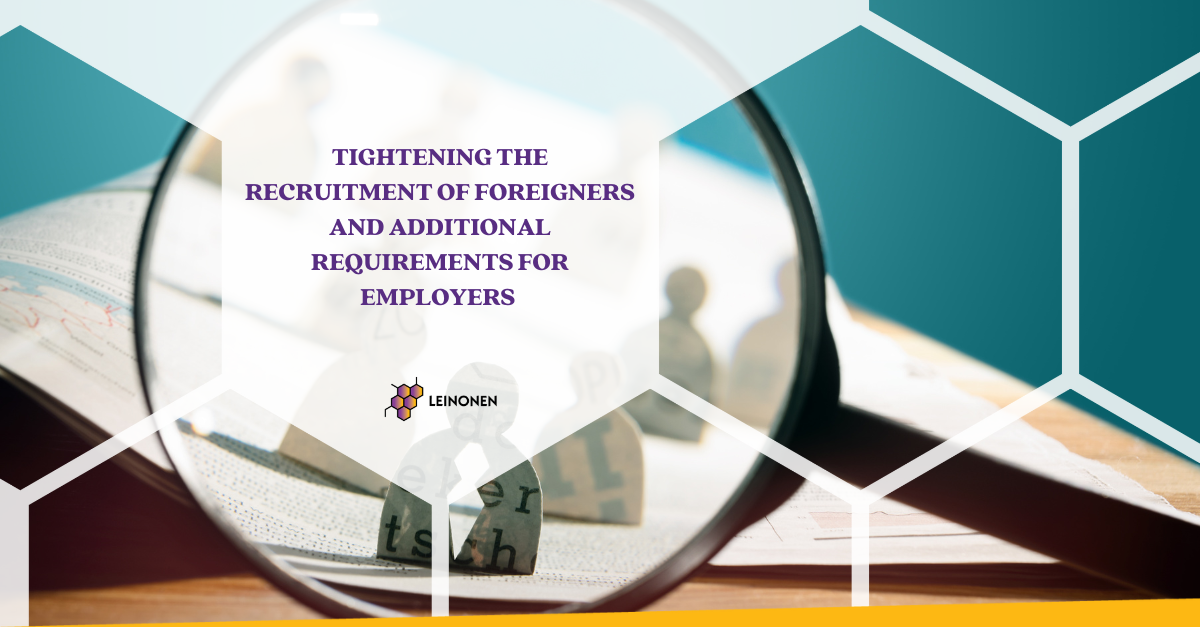Amendments of the Law on the Legal Status of Foreigners of the Republic of Lithuania (“the Law“) entered into force on 1 July 2024. The primary goal of the amendments is to strengthen the employment procedures for third-country nationals in Lithuania. The government of Lithuania has decided to tighten the recruitment of third-country nationals primarily to enhance national security and reduce the increasing number of low-wage workers coming from Central Asia.
The amendments to the Law impose stricter requirements on employers hiring foreign workers: 1) Companies must hold the necessary licenses, 2) have no penalties for failing to report data changes or submitting false information, and 3) actively conduct legitimate business operations in Lithuania.
Operating business in Lithuania is a key requirement for the legal employment of third-country nationals. Simply establishing or acquiring an “empty” company is no longer sufficient for a foreign individual to apply to the Migration Department for a residence permit based on business activities. Similarly, employers can no longer use such newly established companies for employing third-country nationals.
The company (prospective employer) must justify its decision to invite foreign workers by demonstrating to the Migration Department that the company has generated income from the relevant business activity over the past six months. To prove the activity, the company is required to provide documentation such as contracts with service providers and clients, bank statements and other relevant evidence of business.
If the Migration Department determines that a company seeking to employ a foreigner is not conducting real business activities in the Republic of Lithuania (or fails to meet other criteria indicated the Law), the company may be prohibited from issuing mediation letters for at least six months from the date this is confirmed.
Additionally, companies looking to hire third-country nationals are now required to pay a 50 EUR fee for each completed mediation letter (a cost that did not exist previously). It is important to note that the fee for the mediation letter cannot be paid via bank transfer. The payment must be made directly through the MIGRIS account where the mediation letter is being filled. Additionally, employers are not allowed to pay for multiple mediation letters in advance and only after the payment fill them out individually.
Employment opportunities for Ukrainians in Lithuania are also becoming more challenging. Previously, foreigners unable to return to Ukraine and not eligible for temporary protection were exempt from needing a work permit if they met certain exceptions. Meanwhile, as of 1 September 2024, a foreigner who is not entitled to temporary protection but cannot return to Ukraine because of the war and who has applied for a temporary residence permit on the basis of work or humanitarian grounds, acquires right to work not from the date of submission of his/her application, but from the date of obtaining the residence permit.
As before, newly arrived war refugees eligible for temporary protection can begin working after applying for a residence permit under this status.
Please note that foreigners can still work remotely in a company established in the Republic of Lithuania. Such foreigner is exempted from obtaining a work permit and does not need a residence permit, but his/her employment contract should outline the terms for remote work, including the work location (specific address), workplace requirements, tools to be used and other relevant details. It’s also recommended to consult lawyers and tax advisors in the foreign country where the foreigner will be working remotely to better understand the company’s tax obligations there. In the light of the amendments to the Law, before starting official third country nationals’ employment procedures, employers should evaluate the duration of their actual business activity in Lithuania, ensure proper filling of mediation letters and carefully select future employees by assessing their qualifications, professional experience also consider the possibility of a remote employment contract with the foreigner as an option.





